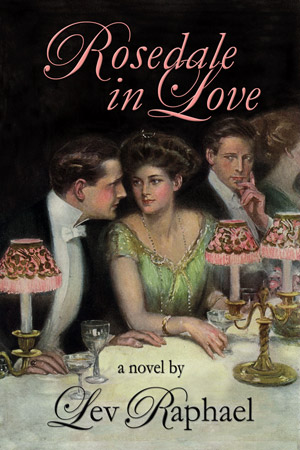Guest Post: Lev Raphael
I believe that the lure of crime fiction for many readers is that it orders a disordered universe, providing justice where none might otherwise exist. You might think that a mystery author would be well-equipped to find a solution when a real life mystery presents itself…but when Lev Raphael came upon the mystery at the core of his mother’s life, he learned that things aren’t as orderly outside of the fictional universe. Sometimes the answers aren’t the ones you might want. And sometimes answers don’t exist at all. So why try to solve a real life mystery? Because in the quest lies a testimony to love.
When Mystery Comes Home
I got my love of crime fiction from my mother, who was a huge fan of Agatha Christie, John Creasey, and the team of Maj Sjowall and Per Wahloo. I read almost all the mystery library books she brought home; they were always better than the books assigned in school! On my own, I discovered the comic mysteries of Phoebe Atwood Taylor. My mother enjoyed a good joke and had an Imogene Coca kind of laugh, but those books weren’t to her taste.
It wasn’t until after she died in 1999 that I discovered profound and unsettling mysteries in her own life that I’m still trying to unravel. My mother was a Holocaust survivor. She lost her family, her home, her freedom–and would have lost her life if the war had lasted any longer than it did. She spoke about those war years sparingly, and when she did, I was too young or too overwhelmed to ask the right questions that would have yielded more information.
Going through her things before the funeral, I found something shocking in her clothes closet. My mother had kept the concentration camp uniform she was wearing when she was liberated by the Americans in April 1945. You’ve probably seen “dresses” like these in movies and documentaries: thin, crudely sewn, it was gray with purplish stripes (though the colors may have changed over the decades). My father told me she’d washed it after the war, but he couldn’t say why she had kept this reminder of her horrible brutalization and the nightmare of seeing her world ground to dust.
I knew the names of the camps my mother had been in and contacted one via email, but nobody could find records for her. This was troubling, since I knew that despite bombings and German attempts to destroy files, records existed for many camps. And then I tried again, this time using the number on her uniform.
A world of mysteries opened up to me. For at least part of the war, my mother Helena Klaczko was listed in several Nazi records as Lidja Garbel. How do I know this Garbel and my mother are the same woman? Because the insanely detailed prisoner card for my mother at Buchenwald has her parents’ name, her street address in Poland, her education, and her birth date. All the information matches what I know to be fact. The woman with that number on her uniform was the woman listed on the card and indisputably my mother.
But why did she have another name? Even more mysterious, in a transport from one camp to another, there was a woman whose number was right before hers whose last name was also Garbel. So somehow, for some reason, my mother took this other woman’s last name as hers. But why? And why Lidja? Was it possible there had been an actual Lidja Garbel whose name my mother had assumed for some reason? The sister of this Frida Garbel?
My father had no idea what the answers were or what any of it could mean. And when I told him that this same Buchenwald prisoner card said my mother was married to a Mikhail Garbel, whereabouts “unknown,” he scoffed. “People said all kinds of things during the war.”
I had written a handful of Nick Hoffman mysteries by this point, and even been reviewed in the New York Times my mother revered. Sadly, my mother never got to read any of them because she was so sick when they started coming. But nothing in any of them matched these real-life mysteries whose solutions I have pursued in many directions, without answer.
Sometimes I wonder if there really was a Mikhail Garbel or even a Lidja Garbel, or if both were made up. Sometimes I think, what if my mother was married before she met my father? Sometimes I think, “There is a book in this, if only I can find it.” And I also wonder if my mother read mysteries not just as a fan, but as someone who had turned her own life into something mysterious.
The son of Holocaust survivors, Lev Raphael is a pioneer in writing fiction about America’s Second Generation, publishing his first short story about children of survivors in 1978. Many of his early stories on this theme were collected in his award-winning book, Dancing on Tisha B’Av.
Born and raised in New York City, he received his MFA in Creative Writing and English at the University of Massachusetts at Amherst where he won the Harvey Swados Fiction Prize, for a Holocaust-themed story later published in Redbook. Winner of the Reed Smith Fiction Prize and International Quarterly’s Prize for Innovative Prose, Raphael holds a Ph.D. in American Studies from Michigan State University. Raphael taught at the university level for 13 years and the first course he designed was a multi-disciplinary study of the Holocaust. He left teaching in 1988 to write and review full-time.







Lev, what a fascinating story! I hope you find the answers and write the book. I’ll be looking for it. And I think you identified the reason we’re drawn to mysteries–maybe they do offer a way of providing justice where it might not otherwise exist.
Comment by Ellis Vidler — February 5, 2012 @ 9:14 pm
Okay, first of all I have to be shallow enough to say this author’s kinda cute.
But oh my goodness what tragedy! And what a strange mystery indeed.
I can identify with never getting to show a mother my achievements, and I’m sorry that happened to you. Know that she’d be proud of you.
Comment by Savvy blue — February 5, 2012 @ 9:35 pm
Wow. How sad and interesting. Thanks for sharing this, Lev.
Jenny, thanks for your always interesting blog.
Comment by Brenda — February 5, 2012 @ 10:51 pm
Life is more amazing than fiction.
Comment by Warren — February 5, 2012 @ 11:07 pm
I’m really intrigued by this real life mystery as well as his mystery books. Thanks for another interesting post, Jenny.
Comment by Lisa wharton — February 6, 2012 @ 12:02 am
Wow. Great post. Great story. Heartbreaking. Thank you for sharing.
Comment by Pamela DuMond — February 6, 2012 @ 1:13 am
Lev,
This is a story I hadn’t heard before. I can only imagine your shock at finding your mother’s old concentration camp dress. And what a mystery — one that will probably never be solved, do you think?
Thanks for sharing this,
Pat Browning
Your Fan and Friend
Comment by Pat Browning — February 6, 2012 @ 5:05 am
WOW! What a story. Once again proving that fact is stranger than fiction. There is certainly a book (if not several) in your mother’s history. I hope you’ll write about it some day. I’d love to read it.
Thanks for a presenting another fascinating author, Jenny.
Comment by mountainmama — February 6, 2012 @ 6:20 am
Thanks to everyone for their responses (Savvy blue, I look better in contacts, actually ).
).
I’ve laid out some more facts in the mystery of my mother’s past in my memoir “My Germany”: http://www.levraphael.com/mygermany.html. But that’s just a start.
Comment by Lev Raphael — February 6, 2012 @ 8:45 am
That’s really an amazing story!! A whole different name and identity? Incredible. I’d love to hear more, so I hope one day you figure it all out and write a stellar memoir about the search!
Thanks for sharing, Lev and Jenny!
Comment by Leah Rhyne — February 6, 2012 @ 8:59 am
I love that cover.
Comment by Alison DeLuca — February 6, 2012 @ 9:41 am
Very interesting. A real mystery. Sometimes life is stranger than fiction.
Regards,
Arthur Levine
Comment by Arthur Levine — February 6, 2012 @ 10:51 am
There are not many survivors left today. I can’t imagine enduring the hell of it. Such a sad story yet powerful. I could understand why you would want to solve this mystery.
Comment by Jacqueline Seewald — February 6, 2012 @ 11:38 am
Very interesting story! Thank you so much for sharing Lev!
Jenny, again another great moment.
Comment by Kellie — February 6, 2012 @ 12:01 pm
Lev, Thank you for sharing your story. I understand the search to learn more about your mother’s life. It wasn’t until after my mother passed away that I learned she was given away by her mother and endured terrible events – a personal holocaust. It took me about 20 years to find people who knew her and who could tell me about the life she never mentioned. I’ve come to know and love her even more since she passed away. She’s also the inspiration behind my current work of fiction in which I write about the South and the harsh conditions for poor families of the 50s and 60s. I wish you all the best in your quest to learn more about your mother’s past.
Comment by Juanita Wilson — February 6, 2012 @ 12:22 pm
Lev, Thank you for sharing this powerful story and the best of luck as you attempt to trace your mother’s past. Please keep us updated.
Thanks, Jenny, for another riveting Moment.
Liz
Comment by Elizabeth C. Main — February 6, 2012 @ 1:34 pm
Lev, I always think truth is more compelling than any fictions we might imagine and that goes double in the case of your mother’s secret past. Thank you for being willing to share something so personal.
Comment by Eloise Hill — February 6, 2012 @ 2:30 pm
Lev, could this have been the uniform of a SS guard or worker. Also, did prisoners in different camps where different uniforms? Go look at uniform pictures. I think there are some in the new Jewish museum here in Philadelphia.
Go to jewish.gen look at pictures there. Is your mother’s name on any lists?
Just some quick thoughts.
Donna
Comment by Donna Tartasky — February 6, 2012 @ 4:06 pm
What a fascinating story! It reminds us that in the course of great tragedy there are thousands upon thousands of individual stories that can be very compelling.
Comment by Neil Plakcy — February 6, 2012 @ 5:27 pm
Donna, this was without a doubt a camp internee’s uniform because it had a number on it, a number I could trace in records that still survived and made it clear it was 1) my mother’s and 2) my mother’s as Lidja Garbel. I looked at Jewishgen years ago, ditto Yad Vashem’s data base, and got no answers, but thanks for the suggestions.
Alison, glad you like the cover of my Gilded Age novel–the artwork dates to 1905 and I own the print.
Thanks, Juanita, for telling some of your story.
Comment by Lev Raphael — February 6, 2012 @ 10:47 pm